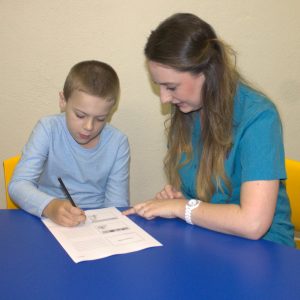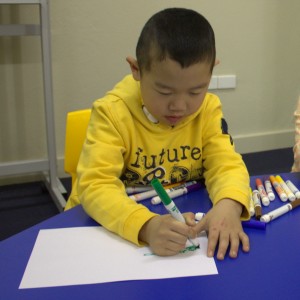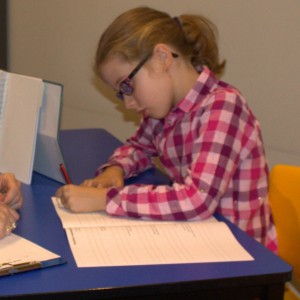 Literacy skills including reading, reading comprehension, written language and spelling are vital skills that affect children's success in all areas of learning at school. Literacy is the way that children access information in all subject areas and is also how they express their knowledge and understanding.
Literacy skills including reading, reading comprehension, written language and spelling are vital skills that affect children's success in all areas of learning at school. Literacy is the way that children access information in all subject areas and is also how they express their knowledge and understanding.
Literacy development begins well before school and continues throughout life, hence poor literacy skills at any age can have long term implications. The NAPLAN (National Assessment Program) website shows that in 2016 testing of year nine students in South Australia 8.1% were below the national standard for reading, 11.7% were below for spelling and 10.6% for grammar and punctuation. A concerning 18.5% were below for writing, which rose to 23.8% for students in the outer suburbs and even higher for students in very remote areas. What causes so many children to struggle with literacy and what can be done to help?
 Language delays and difficulties are the most common reason why children struggle to learn and yet a language assessment is often not suggested for several years after concerns begin, if at all. Speech difficulties can also impact on early literacy development. Understanding why a child is struggling and putting strategies in place to build language skills and support a child’s learning can make a big difference.
Language delays and difficulties are the most common reason why children struggle to learn and yet a language assessment is often not suggested for several years after concerns begin, if at all. Speech difficulties can also impact on early literacy development. Understanding why a child is struggling and putting strategies in place to build language skills and support a child’s learning can make a big difference.
A committee of the Australia senate in September 2014 released a paper titled “Prevalence of different types of speech, language and communication disorders and speech pathology services in Australia”. This stated “The prevalence of speech and language impairment in school aged children is significant, with studies revealing that 13% of children at primary & secondary schools in Australia have communication impairment. Other studies put this figure at a higher level”.” Australian teachers report that 21% of school students have an expressive language difficulty upon entering schooling.”
 The paper also looked at the effects of these difficulties on children and reported ” At the public hearing in Melbourne, Professor Reilly gave evidence that adults (aged 34 years) who had a language impairment at the age of five have up to seven times higher odds of poor reading, five times higher odds of mental health difficulties and three times higher odds of unemployment.”
The paper also looked at the effects of these difficulties on children and reported ” At the public hearing in Melbourne, Professor Reilly gave evidence that adults (aged 34 years) who had a language impairment at the age of five have up to seven times higher odds of poor reading, five times higher odds of mental health difficulties and three times higher odds of unemployment.”
The paper also talked about the importance of communication. “Communication skills are essential in all aspects of life including health and well-being, education and training, family and social relationships, recreation, and work. It has been documented that difficulties in communication skills may have major implications for school success, self-esteem, independence, teacher-student relations, peer relations, literacy and numeracy development, behaviour and problem solving, occupation, economic self-sufficiency and costs to society.” You can download a copy of the report here.
 So what causes language difficulties in children? Children’s development of language depends on many things both within and outside of the child. It is affected by health issues such as hearing, prematurity, general well-being, disabilities and family history of language difficulties. The child’s experiences at home, child care and school also affect how their language develops. When a child has difficulties developing language, there are often a number of things involved. There are also many things that can be done to help the child develop better language skills as well as things that can support their learning and social development to reduce the long term impact of their difficulties.
So what causes language difficulties in children? Children’s development of language depends on many things both within and outside of the child. It is affected by health issues such as hearing, prematurity, general well-being, disabilities and family history of language difficulties. The child’s experiences at home, child care and school also affect how their language develops. When a child has difficulties developing language, there are often a number of things involved. There are also many things that can be done to help the child develop better language skills as well as things that can support their learning and social development to reduce the long term impact of their difficulties.
Different skills are important at different ages. The Speech Pathology Australia Position Paper on Literacy explains that the "development of literacy is supported by knowledge of the sounds of language, vocabulary, the ways sentences are put together, and the ways longer texts (such as stories) are constructed...Different aspects of pre-school language skill predict reading skills at different times. Phonemic awareness (understanding of sounds in words) and knowledge of the alphabet predict early decoding skills (Catts, Fey, Zhang, & Tomblin, 2001), but make less contribution to reading in later years. Knowledge of syntax (sentence structures)and comprehension of oral language is important for reading comprehension in older children (Adlof, Catts & Little, 2006)". A speech pathologist can assess the specific skills needed at each level of a child's development.
[img-4]Some signs a child may be having difficulties with language skills include:
- Not showing the same level of communication, social and literacy skills as others of the same age.
- Difficulties with following instructions or answering questions.
- Difficulty explaining things or retelling experiences.
- Difficulties forming sentences, or spelling when writing.
- Difficulties relating to peers, making and keeping friendships.
- Not progressing with learning, reading or understanding what they read.
[img-5]What can be done to help? A language assessment with a speech pathologist is a good place to start as each child’s challenges and needs are different. A language assessment covers a range of skills in language as well as related areas such as speech and literacy when needed.
Assessment may include:
- the meaning aspects of language such as understanding words and concepts,
- the way words are put together to form sentences,
- use of grammar,
- forming longer pieces of language such as stories,
- how language is used such as in holding a conversation and solving problems,
- speech production or way the child uses sounds to form spoken words,
- written language skills including forming written words, sentences and stories,
- phonological awareness such as understanding sounds, syllables and rhyme, hearing sounds, using letters, breaking down words into separate sounds and blending sounds together to form words
This information allows the speech pathologist to pinpoint the child’s strengths and weaknesses. At the end of the assessment the results are discussed with the parents and where appropriate teachers. The parents and other relevant people are then provided with a written summary of the assessment outcomes and activities and strategies to assist the child. A range of support options such as individual therapy and/or group programs may then be offered.
[img-6]Looking for support for your child? If you have concerns about your child’s speech or language skills the Talking Matters website has information about these skills. We provide individualised assessments and therapy for children with speech, language and learning difficulties and other disabilities. Our aim is to help parents help their child reach their potential.
To find out more about how the
Related Blog Posts
If you liked this post you may also like:
Preparing for reading
Talking diagnosis
More sound awareness
Using MONOPOLY to Grow



